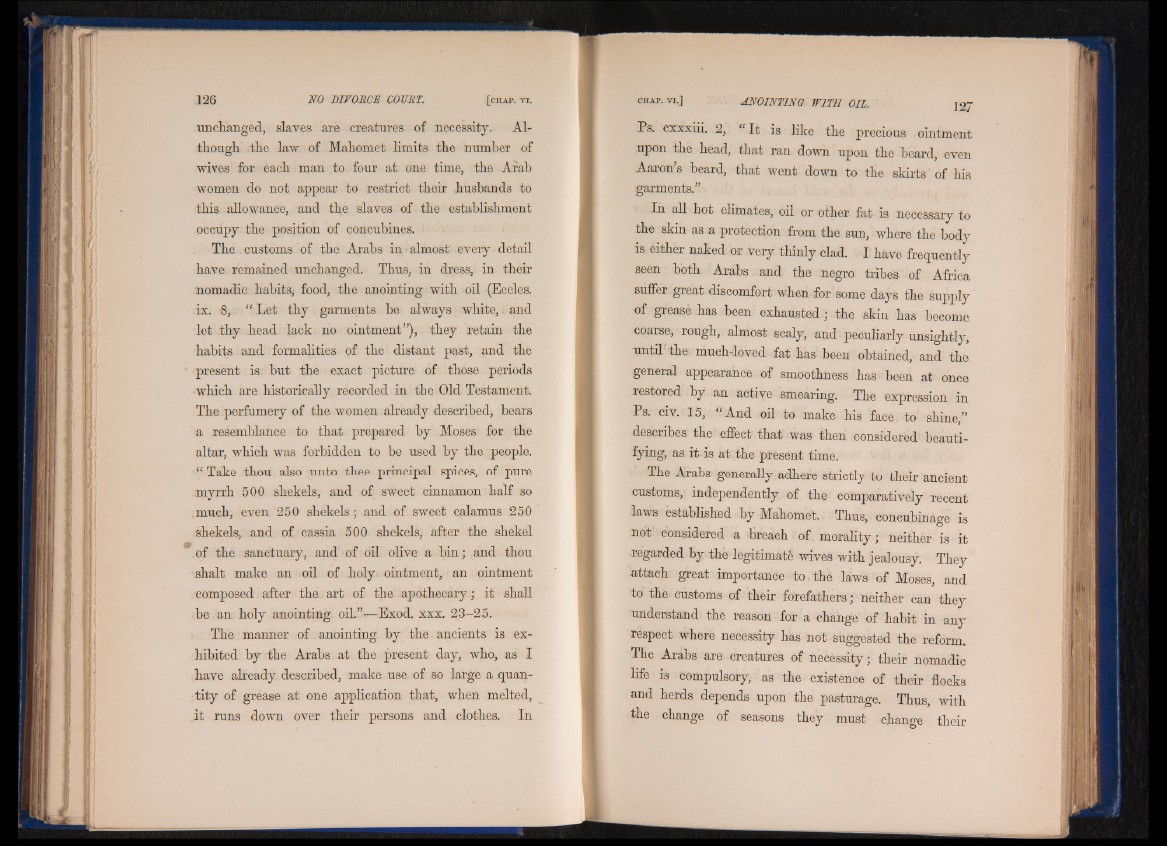
unchanged, slaves are creatures of necessity. Ah
though the law of Mahomet limits the number of
wives for each man to four at one time, the Arab
women do not appear to restrict their husbands to
this allowance, and the slaves of the establishment
occupy the position of concubines.
The customs of the Arabs in > almost' every detail
have remained unchanged. Thus, in dress, in their
nomadic habits^ food, the anointing with oil (Eccles.
ix. 8, “ Let thy garments be always white, and
let thy head lack no ointment”), they retain the
habits and formalities of the distant past, and the
present is but the exact picture of those periods
which are historically recorded in the Old Testament.
The perfumery of the women already described, bears
a resemblance to that prepared by Moses for the
altar, which was forbidden to be used by the people.
“ Take thou also unto thee principal spices, of pure
myrrh 500 shekels, and of sweet cinnamon half so
much, even 250 shekels; and of sweet calamus 250
shekels, and of cassia 500 shekels, after the shekel
of the sanctuary, and of oil olive a bin; and thou
shalt make an oil of holy ointment, an ointment
composed after the i art of the apothecary; it shall
be an holy anointing oil.”-—Exod. xxx. 23-25.
The manner of anointing by the ancients is exhibited
by the Arabs at the present day, who, as I
have already described, make use of so large a quantity
of grease at one application that, when melted,
Lt runs down over their persons and clothes. In
Ps. cxxxiii. 2, “ It is like the precious ointment
.upon the head, that ran down upon the beard> even
Aaron s beard, that went down to the skirts of his
garments.”
In all hot climates, oil or other fat is necessary to
the skin as a protection from the sun, where the body
is either naked or very thinly clad. I have frequently
seen both Arabs and the negro tribes of Africa
suffer great discomfort when for some days the supply
of grease has been exhausted; the skin has become
coarse, rough, almost scaly, and peculiarly unsightly,
until'the much-loved fat has been obtained, and the
general appearance of smoothness has been at once
restored by an active smearing. The expression in
Ps. civ. 15, “And oil to make his face, to shine,”
describes the effect that was then considered beautifying,
as it is at the present time.
The Arabs generally adhere strictly to their ancient
customs, independently of the comparatively recent
laws established by Mahomet. Thus, concubinage is
not considered a breach of morality; neither is it
-regarded by the legitimate wives with jealousy. They
attach great importance to the laws of Moses, and
to the customs of their forefathers ; neither can they
understand the reason for a change of habit in any
rdspect where necessity has not suggested the reform.
The Arabs are creatures of necessity; their nomadic
life is compulsory, as the existence of their flocks
and herds depends upon the pasturage. Thus, with
the change of seasons they must change their